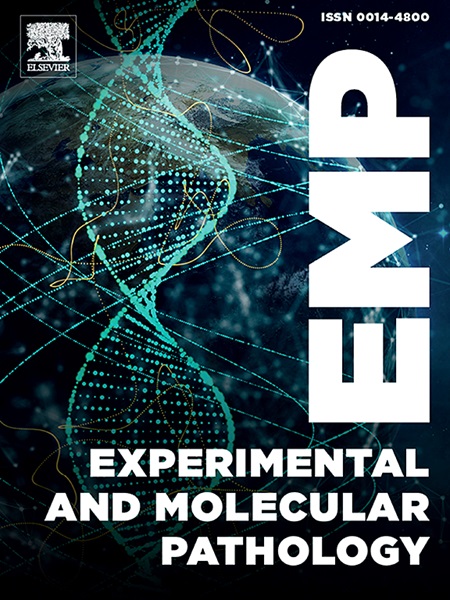血小板源性生长因子- c参与实验性高血压肾炎症,对小管周围毛细血管网络影响不大
IF 3.7
4区 医学
Q2 PATHOLOGY
引用次数: 0
摘要
背景和目的血小板衍生生长因子(PDGF)-C在肾纤维化、血管生成和高血压中起重要作用。虽然它参与损伤的肾小球毛细血管的愈合是公认的,但它在肾小管周围毛细血管(ptc)中的功能仍然知之甚少。因此,本研究探讨了PDGF-C在稳态条件下和血管紧张素II (AngII)诱导高血压的ptc中的作用。材料和方法我们在血管诱导的高血压模型中使用了全身PDGF-C拮抗或条件缺失内皮源性PDGF-C (Cdh5-cre:: pdgfflox /flox)的小鼠。采用qPCR、电镜和荧光显微镜对肾脏PTC网络、糖萼和炎症参数进行分析和定量。结果在AngII模型中,PDGF- c的全身拮抗降低了表达PDGF受体的间充质细胞的小管周围积聚以及Ccl2、Plat和Nos3的表达,而PTC密度和糖萼调节基因未受影响。内皮细胞来源的PDGF-C的条件性缺失不影响小管周围间充质细胞的积聚、血压或与血管生成相关的基因;它对PTC网络或糖萼也没有影响。值得注意的是,在高血压Cdh5-cre::Pdgfcflox/flox -小鼠中观察到炎症浸润减少。结论:尽管PDGF-C会影响内皮稳态的某些关键参数,如高血压患者全身PDGF-C拮抗后PDGFR+周细胞募集,但PDGF-C对PTC网络的影响很小。相反,全身和内皮细胞来源的PDGF-C都能调节与肾脏高血压相关的炎症反应。我们的研究结果有助于减轻药物PDGF-C靶向及其对小管周围毛细血管影响的安全性担忧。本文章由计算机程序翻译,如有差异,请以英文原文为准。
Platelet-derived growth factor-C contributes to kidney inflammation in experimental hypertension with little effect on the peritubular capillary network
Background and aims
Platelet-Derived Growth Factor (PDGF)-C plays a significant role in kidney fibrosis, angiogenesis, and hypertension. While its involvement in the healing of damaged glomerular capillaries is well recognized, its function in kidney peritubular capillaries (PTCs) remains less understood. Therefore, this study investigates the role of PDGF-C in PTCs under both homeostatic conditions and experimentally angiotensin II (AngII)-induced hypertension.
Materials and methods
We utilized mice with systemic PDGF-C antagonism or conditional deletion of endothelial-derived PDGF-C (Cdh5-cre::Pdgfcflox/flox) in an AngII-induced hypertension model. The PTC network, glycocalyx, and inflammatory parameters in the kidneys were analyzed and quantified using qPCR, electron microscopy, and fluorescence microscopy.
Results
Systemic antagonism of PDGF-C in the AngII model reduced peritubular accumulation of PDGF receptor-expressing mesenchymal cells and the expression of Ccl2, Plat and Nos3, while PTC density and glycocalyx-regulating genes remained unaffected. Conditional deletion of endothelial cell-derived PDGF-C did not affect peritubular accumulation of mesenchymal cells, blood pressure or genes associated with angiogenesis; it also had no impact on the PTC network or glycocalyx. Notably, a reduction in inflammatory infiltrates was observed in the hypertensive Cdh5-cre::Pdgfcflox/flox -mice.
Conclusion
Despite influencing certain parameters critical for endothelial homeostasis, such as PDGFR+ pericyte recruitment following systemic PDGF-C antagonism during hypertension, PDGF-C has minimal effects on the PTC network. Conversely, both systemic and endothelial cell-derived PDGF-C modulate the inflammatory response associated with hypertension in the kidney. Our findings help mitigate safety concerns about pharmacological PDGF-C targeting and its impact on peritubular capillaries.
求助全文
通过发布文献求助,成功后即可免费获取论文全文。
去求助
来源期刊
CiteScore
8.90
自引率
0.00%
发文量
78
审稿时长
11.5 weeks
期刊介绍:
Under new editorial leadership, Experimental and Molecular Pathology presents original articles on disease processes in relation to structural and biochemical alterations in mammalian tissues and fluids and on the application of newer techniques of molecular biology to problems of pathology in humans and other animals. The journal also publishes selected interpretive synthesis reviews by bench level investigators working at the "cutting edge" of contemporary research in pathology. In addition, special thematic issues present original research reports that unravel some of Nature''s most jealously guarded secrets on the pathologic basis of disease.
Research Areas include: Stem cells; Neoangiogenesis; Molecular diagnostics; Polymerase chain reaction; In situ hybridization; DNA sequencing; Cell receptors; Carcinogenesis; Pathobiology of neoplasia; Complex infectious diseases; Transplantation; Cytokines; Flow cytomeric analysis; Inflammation; Cellular injury; Immunology and hypersensitivity; Athersclerosis.

 求助内容:
求助内容: 应助结果提醒方式:
应助结果提醒方式:


